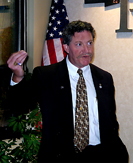Seattle
PI Commentary
Thursday,
March 31, 2005
Junkies
look for traffic fix
By
ED STERN
GUEST COLUMNIST
Leaders in the political and planning
arenas are like junkies when it comes to transportation
issues. Unable to imagine solutions beyond the old 20th-century
model of the physical movement of getting goods and services
to market, we struggle with how to get more commuters
to distant workplaces. Think tanks such as the Cascadia
Center are touted as agents of change and "breakthrough
thinking," such as bus rapid transit instead of light
rail, or multi-modal systems such as Vancouver, B.C.'s
rail-bus-minibus smorgasbord are served up as innovative.
Meanwhile, our transportation bottlenecks
get worse, the commute times matched only by soaring fuel
prices and ozone-depleting emissions. Politicians are
left to react rather than lead; the future is mortgaged
to demands for "relief" in the present.
Cascadia gives us still more "fixes,"
just different, much like methadone treatment was presented
as a solution to heroin addiction in the '70s, not by
questioning the behavior but by redirecting it in increments
to a more socially acceptable cost. Problem is, the underlying
problem is never confronted.
The real crying shame is how close
Cascadia got to getting it right. It was in the name of
its recent conference, "Transportation and Technology,"
the subject of a March 17 column in the Post-Intelligencer
("We're on the wrong road for traffic fixes"). Unfortunately,
the "technology" portion was relegated to serving old
notions and the underlying lifestyle choices of getting
workers to distant-from-the-home workplaces remained unchallenged.
Here on the Kitsap peninsula, realization
that no amount of physical transportation solutions would
rescue us from our "watery box" of distant job commuting
to King, Pierce and Snohomish counties has put into sharp
focus the need to explore alternatives. From the time
of World War II on, commuting across the Sound has become
the largest segment of new primary employment for residents.
With close to half our work force traveling in their cars
or buses to ferries and bridges in long exhaust-choked
lines, commute times stretch from three to four hours
daily.
Who's home with the kids? Who has
time for "community"? And what of the environmental damage
for that matter, let alone the taxpayer-borne costs for
an insatiable appetite for more and larger roads, which
in a generation only encourages even more far-flung commuting.
We realized to be careful what you wish for; more ferries,
bridges and highways would lead only to more "empty" bedroom
communities and little true tax-base expansion at home
to pay for public services and schools.
Back to the Cascadia-missed premise
of "Transportation and Technology," but this time with
the emphasis on technology. The Puget Sound area has one
of the nation's largest concentrations of "knowledge workers,"
due to our many high-tech jobs. The recent emergence of
high-speed fiber optic broadband connections allows for
virtual meetings, with scores of co-workers simultaneously
exchanging reams of documents live time. Certainly some
knowledge workers need not report for work at central
office buildings every day; couldn't they telework at
least part-time? Those who labor with their heads need
not compete daily with those who must labor with their
hands.
We know that just a 10 percent
diminishment of peak-load travel frees up roads from gridlock,
without spending billions of taxpayer dollars. People
could telecommute from their own communities; together
with mass transit systems and intelligent private vehicle
use for the rest of us, that could achieve a huge tax
savings and save on social and environmental costs as
well.
Like the carpool-based Pollution
Control Tax Credit bill of 10 years ago, businesses could
receive tax breaks for worker telecommuting. Now that
would be a "Transportation and Technology" leadership
forum worth attending -- as opposed to more "fixes."
Ed Stern is a
Poulsbo city councilman and board member of the Kitsap
Economic Development Council where he chairs the Regional
Telecommunications Committee.


